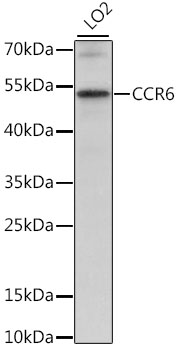-
Product Name
CCR6 Polyclonal Antibody
- Documents
-
Description
Polyclonal antibody to CCR6
-
Tested applications
WB
-
Species reactivity
Human
-
Alternative names
CCR6 antibody; BN-1 antibody; C-C CKR-6 antibody; CC-CKR-6 antibody; CCR-6 antibody; CD196 antibody; CKR-L3 antibody; CKRL3 antibody; CMKBR6 antibody; DCR2 antibody; DRY6 antibody; GPR29 antibody; GPRCY4 antibody; STRL22 antibody; C-C chemokine receptor type 6 antibody
-
Isotype
Rabbit IgG
-
Preparation
Antigen: A synthetic peptide corresponding to a sequence within amino acids 300 to the C-terminus of human CCR6 (NP_004358.2).
-
Clonality
Polyclonal
-
Formulation
PBS with 0.02% sodium azide, 50% glycerol, pH7.3.
-
Storage instructions
Store at -20℃. Avoid freeze / thaw cycles.
-
Applications
WB 1:500 - 1:2000
-
Validations

Western blot - CCR6 Polyclonal Antibody
Western blot analysis of extracts of LO2 cells, using CCR6 antibody at 1:1000 dilution.Secondary antibody: HRP Goat Anti-Rabbit IgG (H+L) at 1:10000 dilution.Lysates/proteins: 25ug per lane.Blocking buffer: 3% nonfat dry milk in TBST.Detection: ECL Basic Kit .Exposure time: 10s.
-
Background
Receptor for the C-C type chemokine CCL20. Binds to CCL20 and subsequently transduces a signal by increasing the intracellular calcium ion levels. Although CCL20 is its major ligand it can also act as a receptor for non-chemokine ligands such as beta-defensins. Binds to defensin DEFB1 leading to increase in intracellular calcium ions and cAMP levels. Its binding to DEFB1 is essential for the function of DEFB1 in regulating sperm motility and bactericidal activity. Binds to defensins DEFB4 and DEFB4A/B and mediates their chemotactic effects. The ligand-receptor pair CCL20-CCR6 is responsible for the chemotaxis of dendritic cells (DC), effector/ memory T-cells and B-cells and plays an important role at skin and mucosal surfaces under homeostatic and inflammatory conditions, as well as in pathology, including cancer and various autoimmune diseases. CCR6-mediated signals are essential for immune responses to microbes in the intestinal mucosa and in the modulation of inflammatory responses initiated by tissue insult and trauma. CCR6 is essential for the recruitment of both the proinflammatory IL17 producing helper T-cells (Th17) and the regulatory T-cells (Treg) to sites of inflammation. Required for the normal migration of Th17 cells in Peyers-patches and other related tissue sites of the intestine and plays a role in regulating effector T-cell balance and distribution in inflamed intestine. Plays an important role in the coordination of early thymocyte precursor migration events important for normal subsequent thymocyte precursor development, but is not required for the formation of normal thymic natural regulatory T-cells (nTregs). Required for optimal differentiation of DN2 and DN3 thymocyte precursors. Essential for B-cell localization in the subepithelial dome of Peyers-patches and for efficient B-cell isotype switching to IgA in the Peyers-patches. Essential for appropriate anatomical distribution of memory B-cells in the spleen and for the secondary recall response of memory B-cells (By similarity). Positively regulates sperm motility and chemotaxis via its binding to CCL20.
Related Products / Services
Please note: All products are "FOR RESEARCH USE ONLY AND ARE NOT INTENDED FOR DIAGNOSTIC OR THERAPEUTIC USE"
